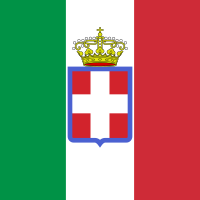Royal Italian Army
Regio Esercito Italiano Royal Italian Army | |
|---|---|
 War Flag of the Regio Esercito | |
| Active | 1861–1946 |
| Country | |
| Allegiance | King of Italy |
| Type | Army |
| Size | 5,000,000 (1915) 1,600,000 (1939) 3,500,000 (1943) |
| Part of | Italian Armed Forces |
| Colors | Green, White and Red |
| Anniversaries | 4 November |
| Engagements | Italian War of Independence Mahdist War Italo-Ethiopian War (1895–96) Boxer Rebellion Italo-Turkish War World War I Pacification of Libya Italo-Ethiopian War (1935–36) Spanish Civil War Italian invasion of Albania World War II |
| Commanders | |
| Ceremonial chief | First Marshal of the Empire |
| Notable commanders | Victor Emmanuel II, Pietro Badoglio, Luigi Cadorna, Armando Diaz Alfredo Guzzoni |
The Royal Italian Army (Italian: Regio Esercito Italiano) was the army of the Kingdom of Italy from the unification of Italy in 1861 to the birth of the Italian Republic in 1946. In World War II the Royal Army fought first as part of the Axis (1939–43) and then as a co-belligerent of the Allies (1943–45). After the monarchy ended, the army changed its name to become the Italian Army (Esercito Italiano).
Contents
1 History
1.1 Origins
1.2 World War I
1.3 Interwar period
1.4 World War II
2 Main campaigns
2.1 19th century
2.2 20th century
3 See also
4 References
5 External links
History
Origins
The Regio Esercito dates from the proclamation of the Kingdom of Italy, following the unification of Italy in 1861 after the Papal States were seized. On 4 May 1861, Manfredo Fanti signed the creation decree, by which the new army was to replace the previous Royal Sardinian Army and the Army of the Two Sicilies.
The first two tasks of the new organization were the repression of brigandage in southern Italy against irregular and hit and run forces (mixed with bands of various criminals), who refused to accept the suppression of the Kingdom of Two Sicilies, and the Third War of Italian Independence. On 20 September 1870, the IV Corps captured Rome, which had remained under Papal control up until then.
On 8 February 1885, a corps of fewer than 1,000 soldiers landed at Massaua, Eritrea, starting the creation of an Italian colonial empire. The Italian advance was halted at the Battle of Adwa by overwhelming Ethiopian forces. The following year, as part of the Italian collaboration with the international pacification program after the revolt against the Turkish domination in Cyprus, another corps disembarked at Candia. On 14 July 1900, another expeditionary force was constituted to suppress the Boxer Rebellion in China in defense of the European protectorates.
On 3 October 1911, Italy invaded Libya as part of the Italo-Turkish War. The war against the Ottoman Empire ended with the signing of the First Treaty of Lausanne in Ouchy, near Lausanne, Switzerland.[1][2]
World War I
The Royal Italian Army's first experience with modern warfare was in World War I, from 1915–1918. The war was fought mostly on the Italian Front in Northern Italy, costing the Italian Army serious casualties, including about 600,000 dead.
Interwar period
During the Interwar period, the army participated in the final subjugation of Libya, participated in the invasion of Ethiopia, provided troops and materials for the Corps of Volunteer Troops (Corpo Truppe Volontarie) to fight in the Spanish Civil War, and participated in the Italian invasion of Albania.
World War II
The Regio Esercito (Royal Army) was one of the largest ground forces in World War II, during which it was one of the pioneers of the use of paratroopers.[citation needed] Many Italian divisions were reinforced by a MVSN Gruppo di Assalto of two battalions due to the small size of the divisions.
In 1943, Italy surrendered and split into the Italian Social Republic, which fielded its own army, the Esercito Nazionale Repubblicano (National Republican Army). On the other side was the Esercito Cobelligerante del Sud (Italian Co-Belligerent Army), the army of the Italian Royalist forces, fighting on the side of the Allies in southern Italy after the Allied armistice with Italy in September 1943.
The Kingdom was ultimately replaced by the Italian Republic in 1946, and the Royal Army accordingly changed its name to become the Esercito Italiano (Italian Army).
Main campaigns
19th century
- Italian War of Independence (1866)
- Mahdist War (1881–1899)
- Italo-Ethiopian War (1895–1896)
20th century
- Boxer Rebellion (1900)
- Italo-Turkish War (1911–1912)
- World War I (1915–1918)
- Pacification of Libya (1923-1932)
- Italo-Ethiopian War (1935–1936)
- Intervention in the Spanish Civil War (1936–1939)
- Italian invasion of Albania (1939)
World War II (1940–1945)- Regio Esercito (World War II)
Italian Co-Belligerent Army (1943–1945)- Esercito Nazionale Repubblicano
See also
- Italian Army
- Corpo Aeronautico Militare
- List of Italian Army equipment in World War II
- Regia Marina
- Regia Aeronautica
- Esercito Nazionale Repubblicano
References
^ Treaty of Peace Between Italy and Turkey The American Journal of International Law, Vol. 7, No. 1, Supplement: Official Documents (Jan., 1913), pp. 58–62 doi:10.2307/2212446
^ "Treaty of Lausanne, October, 1912". Mount Holyoke College, Program in International Relations..mw-parser-output cite.citationfont-style:inherit.mw-parser-output .citation qquotes:"""""""'""'".mw-parser-output .citation .cs1-lock-free abackground:url("//upload.wikimedia.org/wikipedia/commons/thumb/6/65/Lock-green.svg/9px-Lock-green.svg.png")no-repeat;background-position:right .1em center.mw-parser-output .citation .cs1-lock-limited a,.mw-parser-output .citation .cs1-lock-registration abackground:url("//upload.wikimedia.org/wikipedia/commons/thumb/d/d6/Lock-gray-alt-2.svg/9px-Lock-gray-alt-2.svg.png")no-repeat;background-position:right .1em center.mw-parser-output .citation .cs1-lock-subscription abackground:url("//upload.wikimedia.org/wikipedia/commons/thumb/a/aa/Lock-red-alt-2.svg/9px-Lock-red-alt-2.svg.png")no-repeat;background-position:right .1em center.mw-parser-output .cs1-subscription,.mw-parser-output .cs1-registrationcolor:#555.mw-parser-output .cs1-subscription span,.mw-parser-output .cs1-registration spanborder-bottom:1px dotted;cursor:help.mw-parser-output .cs1-ws-icon abackground:url("//upload.wikimedia.org/wikipedia/commons/thumb/4/4c/Wikisource-logo.svg/12px-Wikisource-logo.svg.png")no-repeat;background-position:right .1em center.mw-parser-output code.cs1-codecolor:inherit;background:inherit;border:inherit;padding:inherit.mw-parser-output .cs1-hidden-errordisplay:none;font-size:100%.mw-parser-output .cs1-visible-errorfont-size:100%.mw-parser-output .cs1-maintdisplay:none;color:#33aa33;margin-left:0.3em.mw-parser-output .cs1-subscription,.mw-parser-output .cs1-registration,.mw-parser-output .cs1-formatfont-size:95%.mw-parser-output .cs1-kern-left,.mw-parser-output .cs1-kern-wl-leftpadding-left:0.2em.mw-parser-output .cs1-kern-right,.mw-parser-output .cs1-kern-wl-rightpadding-right:0.2em
External links
- Regio Esercito